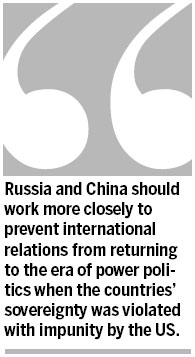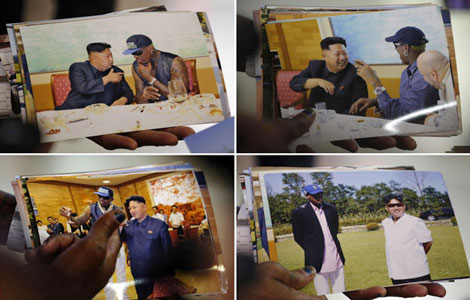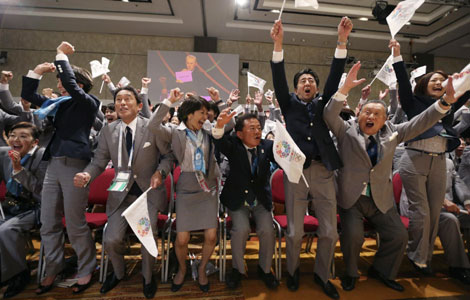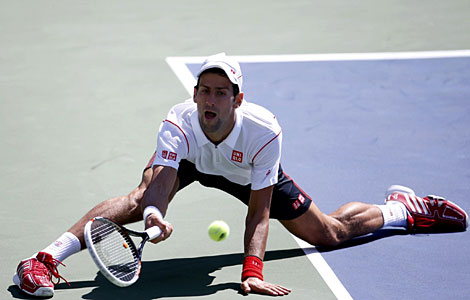Nervous US and China-Russia ties
Updated: 2013-09-09 07:04
By Victor Larin (China Daily)
|
||||||||
The White House seems to be have become a little nervous in recent years. It looks like some "minor annoyances", such as the setbacks of anti-government forces in Syria, former National Security Agency operative Edward Snowden's revelations, and some domestic problems, have pushed US President Barack Obama to take sharp steps and issue strong statements. Perhaps the developments have also prompted Obama to declare the United States' commitment to power politics, although he has used democracy and justice to justify such expressions.
The expos of Washington's surveillance program by Snowden didn't force the US to turn cold toward Russia. It was something more than that.
Russia, like China, does not share the White House's conviction that only Washington has the right to decide the fate of the world, and refuses to follow the US' dictates in international relations. The US is set to launch attacks on Syria, and in the process it would like once again to discredit its two main policy opponents, Russia and China, in the eyes of the American public and people across the rest of the world. The US aims to use the Snowden case - that Russia has granted him asylum - and the baseless accusation against China as an "Internet spy" to discredit them.
The fact is that all developed countries have Internet spying networks. But ordinary people have come to realize the seriousness of the problem only after Snowden's revelations.
The US has the most potent Internet spying network in the world, and it uses its connections with telecom giants like Google, Apple, Yahoo, YouTube and Skype to snoop into people's lives. The hype created by the US over Russian and Chinese Internet espionage networks is also an attempt to divert attention from its own activities. The technique of accusing others to divert attention from one's own wrongdoings is as old as the times. The US uses its powerful propaganda machine to divert attention from its own dirty work.

Despite all this, Russia-US relations are not likely to deteriorate to a point of no return, even though their bilateral ties are incomplete and diversified.
It's true that the Russia-US trade volume in 2012 was just more than $28 billion, one-third of that between Russia and China. And the US is not even among the top 10 foreign investors in Russia, with the volume of accumulated American investment in the Russia dropping over the past five years by about $500 million. But despite the relative economic weakness of Russia and the unimpressive Russia-US economic ties, Washington cannot ignore Moscow, especially because of the possibility of joint Russia-China actions in the international arena.
In contrast to Russia-US ties, economic relations are central to Sino-US ties, though economic interdependence is not the only criterion for a peaceful long-term relationship. There is more to bilateral relations than trade. For example, China and the US follow different ideologies and have different social systems, and some people even say they have a trust deficit. But still they are each other's major trade partners. Which means genuine trust is impossible without mutual understanding between countries.
For Russia and China both, social and political stability at home is most crucial, and they earnestly believe that domestic problems have to be solved domestically. This has been the driving factor in the relationship. The US being a global power has become used to solving its domestic problems at the expense of other countries, shifting the focus of its citizens to external threats to US interests, regardless of whether they are real or construed.
The US' recent policy moves should force Russia to think seriously about the its policy toward China. The US, which is known to defend its own interests in international relations, is now reluctant to talk with Russia on equal terms. So Russia and China should work more closely to coordinate their actions on the global stage to prevent international relations from returning to the era of power politics when the countries' sovereignty was violated with impunity by the US.
In today's world, Russia-China strategic partnership acts like a political union for advancement of peace and prosperity in the world. Although this union is not defined by special agreement and doesn't have a "military" prefix attached to it, the two countries do face some common political threats because of the deteriorating international order.
I am convinced that the use of military force worsens existing situations. So Russian-Chinese military exercises should not be more than an examination of their respective potentials. This is what any independent state should do to restore the international order.
The author is director of Institute of History, Archaeology and Ethnography of the Peoples of the Far East, Far Eastern Branch, Russian Academy of Sciences.
(China Daily 09/09/2013 page9)

 Panda 'Bai Yun' celebrates 22nd birthday in US
Panda 'Bai Yun' celebrates 22nd birthday in US
 Exports expand in Aug amid signs of recovery
Exports expand in Aug amid signs of recovery
 Rodman back from DPRK without jailed American
Rodman back from DPRK without jailed American
 National Games: Pictures of the day
National Games: Pictures of the day
 Abe speech helps secure 2020 Games for Tokyo
Abe speech helps secure 2020 Games for Tokyo
 Djokovic, Nadal set up blockbuster US Open final
Djokovic, Nadal set up blockbuster US Open final
 Xi discusses bilateral ties with Kazakh parliament speaker
Xi discusses bilateral ties with Kazakh parliament speaker
 'Poetic' Italian documentary takes top honor at Venice filmfest
'Poetic' Italian documentary takes top honor at Venice filmfest
Most Viewed
Editor's Picks

|

|

|

|

|

|
Today's Top News
China will stay the course on sustainable growth
Chinese president arrives in Uzbekistan for visit
China's top admiral visits US
Exports expand in August
Guangzhou to end labor camps
Liu Zhijun associate charged
Trending news across China on Sept 9
Network to take care of mentally ill
US Weekly

|

|






